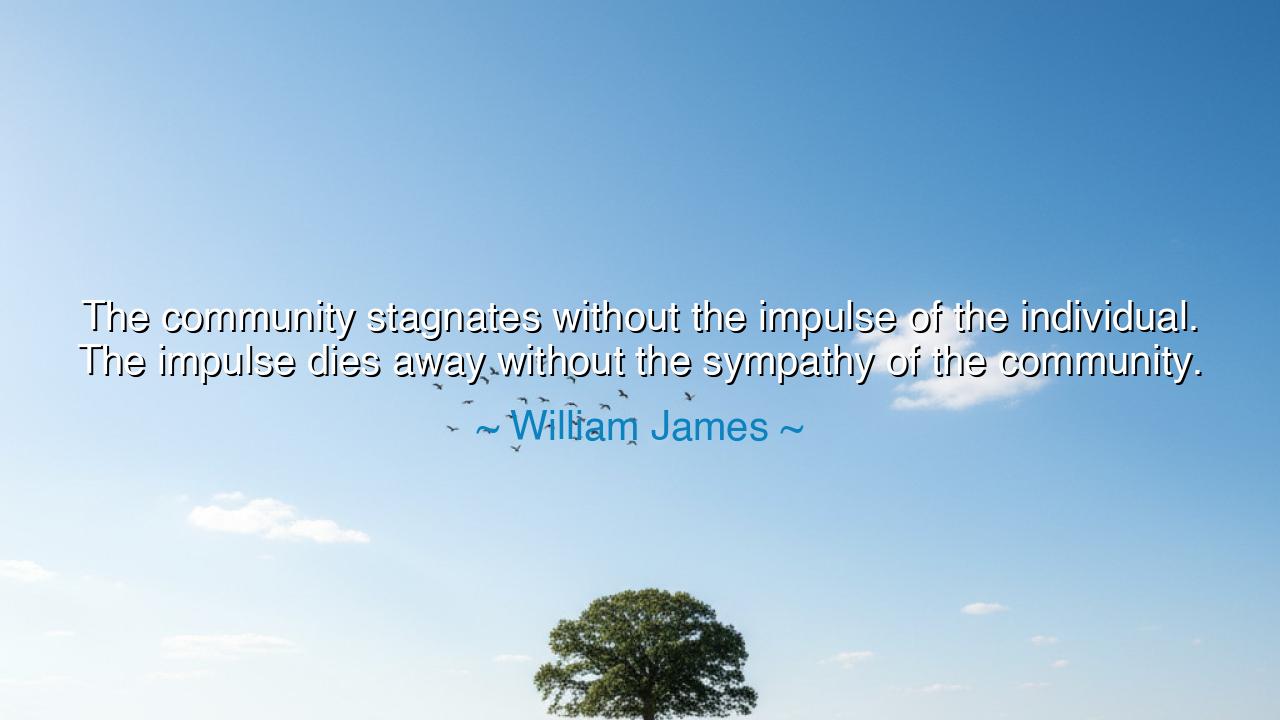
The community stagnates without the impulse of the individual.
The community stagnates without the impulse of the individual. The impulse dies away without the sympathy of the community.






Hear, O children of the future, the words of the great philosopher William James, who speaks with the clarity of the ancients: "The community stagnates without the impulse of the individual. The impulse dies away without the sympathy of the community." These words speak to the heart of what it means to live together, to be part of a whole greater than ourselves. They remind us that the community—that great, living organism—is not a passive entity but one that thrives through the dynamic tension between individual action and collective support. Just as the body cannot live without the blood that flows through it, so too can the community not survive without the impulse of the individual, and the individual cannot reach their full potential without the sympathy and support of those around them.
In the ancient world, O children, the Greeks understood the delicate balance between the individual and the collective. The city-state—be it Athens or Sparta—was not simply a collection of people, but a living organism that required the individual to bring forth their best qualities in service of the whole. Socrates, that wise and humble philosopher, believed that the individual had a duty to question, to challenge, and to inspire the community to greater wisdom. Yet, he also knew that his wisdom would fall on deaf ears without the support of a community willing to listen, to reflect, and to act. The impulse of the individual, no matter how great, requires the sympathy of the community to be realized.
Consider the story of Alexander the Great, who sought to unite the known world under a single banner. Alexander’s brilliance, his passion, and his vision were undeniably his own, but they were made possible only because his soldiers, his followers, and his generals shared in that vision. They gave their support and sympathy, following him into battle, trusting in his leadership and strength. Had they not rallied behind him, Alexander’s impulse to conquer would have been nothing more than an empty dream. It was in the community of his army that his vision was brought to life. The same principle applies to all human endeavors—whether in war, in art, or in philosophy. The individual impulse is like a spark, but it requires the fuel of community to ignite and to sustain it.
Without community, however, the impulse of the individual withers and dies. Imagine, O children, a brilliant artist whose work speaks to the soul but is hidden in isolation, never seen by others. Their vision, their unique impulse, is wasted, for it is not shared. The community, in this case, plays the crucial role of providing the space, the audience, and the support needed to bring that vision into the world. The individual may possess boundless creativity, but without the sympathy and encouragement of others, that creativity remains dormant, never achieving its full potential. The community, in turn, thrives when the individual adds their unique energy, passion, and vision to the collective experience.
Let us turn to the Renaissance, that golden age of human achievement, to see the dynamic between the individual and the community in full bloom. The works of Leonardo da Vinci, Michelangelo, and Raphael were the products of individual genius, but their work was only made possible by the support of the community—the patrons, the city-states, and the churches that recognized the value of these individuals and provided them with the resources, the space, and the sympathy to realize their ideas. It was in this mutual exchange, this harmonious relationship between individual and community, that the Renaissance flourished, and the greatest works of art and science were born. Without the support of the community, the impulses of these great minds would have been stifled, unrecognized, and lost to history.
So, O children, what is the lesson to carry forward? The strength of any society lies not just in the actions of its leaders or the passions of its individuals, but in the relationship between the two. It is the individual who brings forth new ideas, new dreams, new innovations—but it is the community that provides the support and the space for these impulses to flourish. Likewise, the community cannot thrive without the unique contributions of its members. Without the impulse of the individual, the community stagnates, becoming a mere shadow of what it could be. And without the sympathy of the community, the individual’s dreams fade into silence, never to be realized.
Therefore, O children, take this wisdom to heart: the success of your life and the success of your world depend upon this delicate balance. As you seek to create, to innovate, to inspire, remember that you are not alone. Your impulse must be nourished by those around you, just as you, too, must offer your support and sympathy to others. Work in harmony with those around you, for it is only when the individual and the community come together that greatness can emerge. The world does not need solitary genius, nor does it thrive on empty unity—it needs the union of both.






AAdministratorAdministrator
Welcome, honored guests. Please leave a comment, we will respond soon